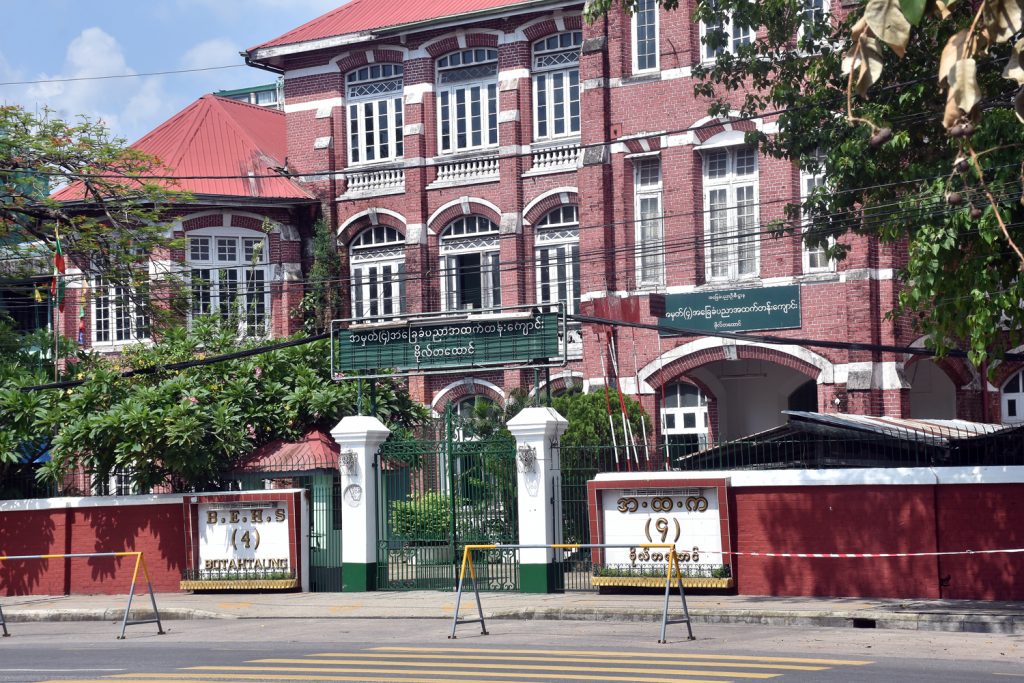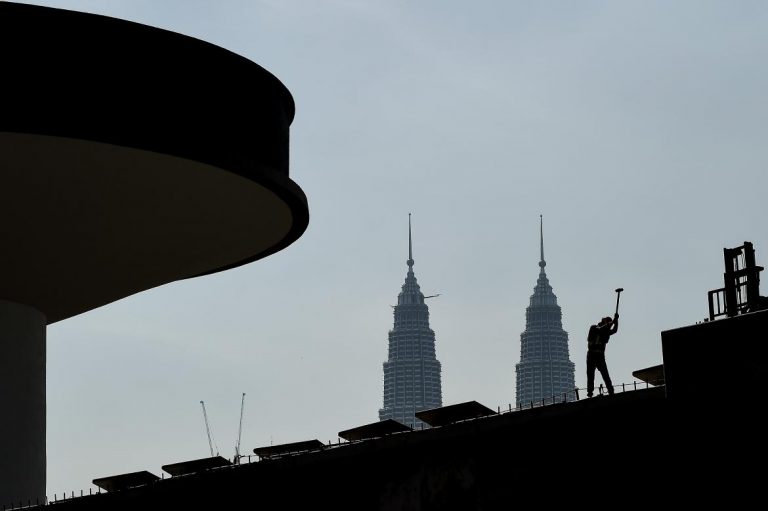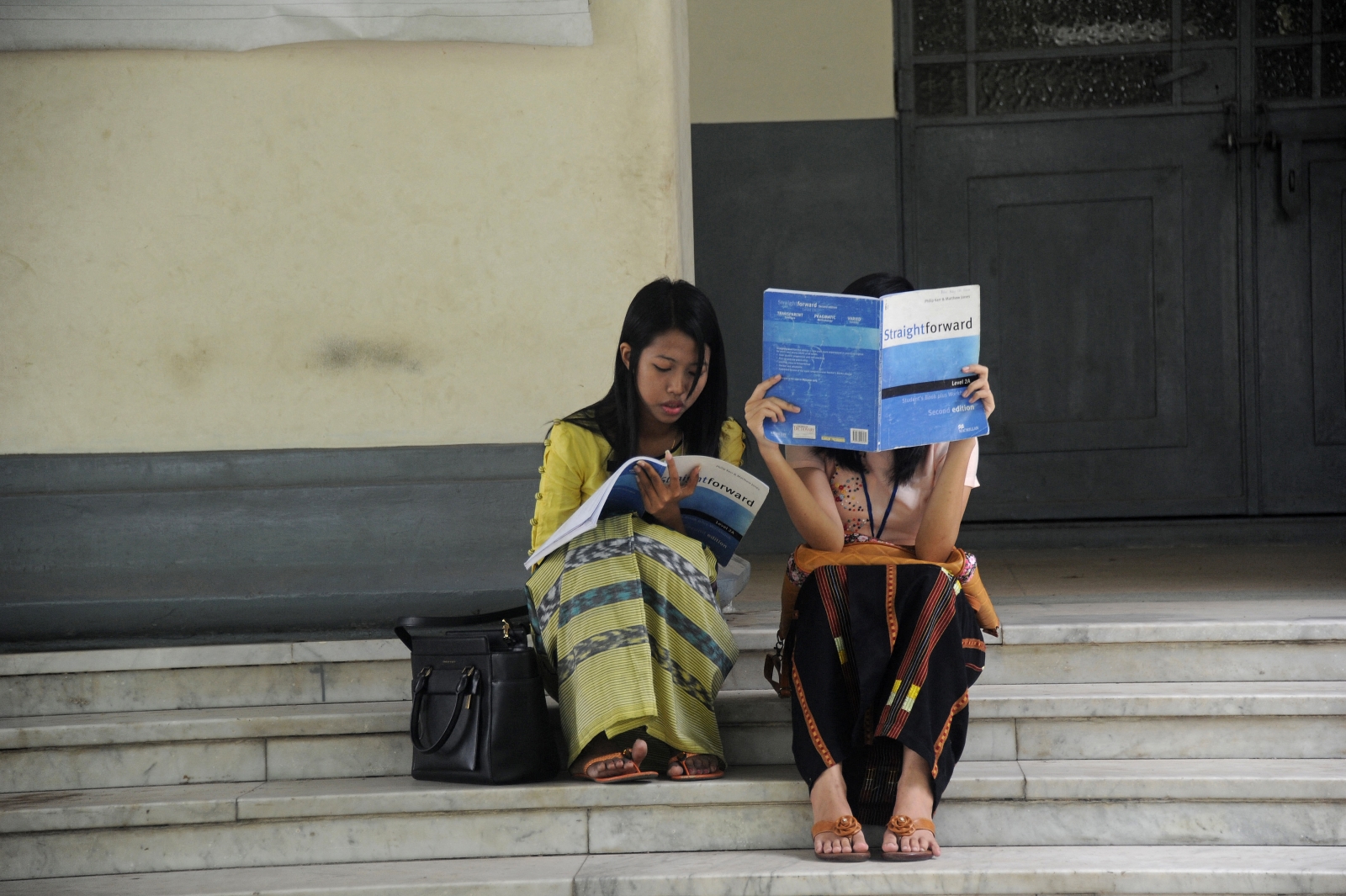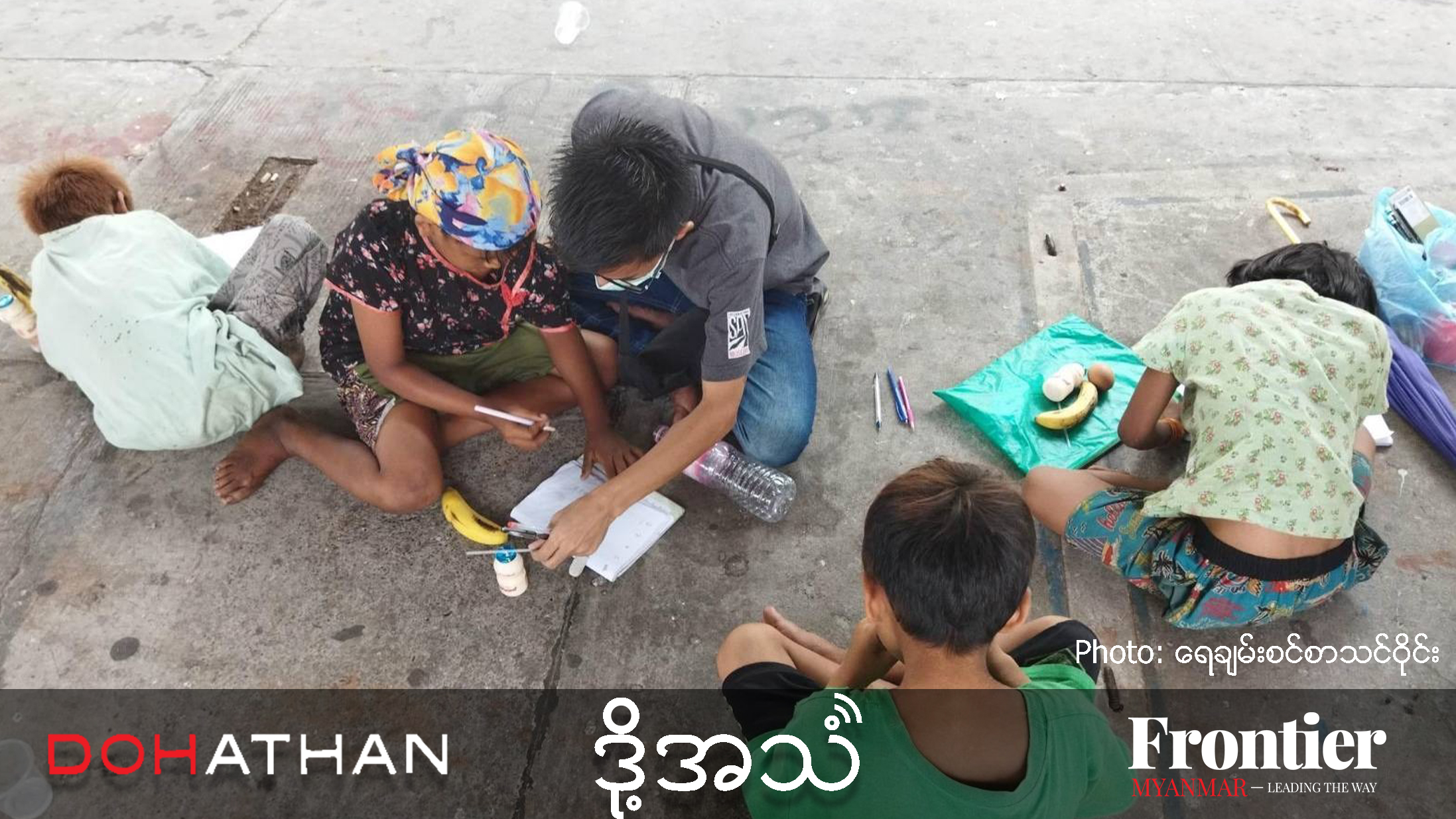Teachers in the Civil Disobedience Movement believe the recruitment of daily wage earners to teach in re-opened government schools will result in “fake education”.
By FRONTIER
Daw Sandar Moe is one of more than 139,000 teachers who have been sacked for participating in the Civil Disobedience Movement against the military coup.
“I am very proud of being dismissed by the coup government. It is better to be jobless than working for the junta,” said Sandar Moe, 48, a high school teacher, who continues to resist pressure and threats from senior education officials to return to work.
The teacher, who asked that her real name not be used for fear of reprisals, is among hundreds of thousands of civil servants who are said by CDM leaders to have gone on strike in protest at the military’s seizure of power from the civilian government on February 1.
The CDM has caused huge disruption to education and healthcare as well as other government services, including the railways and electricity supply.
Only a fraction of the nation’s 47,000 basic education schools were able to reopen for the start of the academic year on June 1 because of striking teachers and boycotts by students and teachers, giving the lie to the junta’s insistence that the situation in the country had returned to normal.
The regime, which calls itself the State Administration Council, has used persuasion and the threat of punishment to try to convince CDM participants to return to work. As well as sacking teachers such as Sandar Moe, over 270 education department employees who joined the CDM have been charged or sentenced for incitement under section 505A of the Penal Code, which carries a maximum three-year jail sentence, based on a review of announcements of charges in state run media by Frontier.
The retired vice rector of an education college, who requested anonymity, said that when teachers joined the CDM, the regime was unable to replace them. Nonetheless, he said the junta tried to “force schools to reopen as they normally would, despite the threat of COVID-19” because it “wanted to show the people and the world that their administration was functioning well”.
This determination has led to a hasty scramble for substitute teachers employed on a daily basis without the usual competitive hiring process, and with minimal training. Striking teachers worry that these lowered recruiting standards, and the likely reluctance of many aspiring teachers to work at junta-run schools, will result in children being taught by “unqualified” teachers and the rapid degradation of public education after years of reform.
Teaching right from wrong
Participation in the CDM has fluctuated hugely between different branches of government, but it has been particularly strong in the public education sector. Even before it seized power, the Tatmadaw and its allied party, the Union Solidarity and Development Party, antagonised schoolteachers by accusing them of helping the National League for Democracy commit voter fraud in the general election of November last year.
Teachers made up most of the polling station workers in that vote, and for Sandar Moe, the fraud allegations showed an insulting disregard for their hard work.
“On election day, we worked hard the whole day. We skipped our meals and returned home at midnight. It was really upsetting and like a joke that the military used election fraud as its justification for seizing power,” said Sandar Moe.
After trying for almost three months to persuade striking teachers to return to work, the SAC education ministry sacked more than 120,000, or nearly 27 percent, of the country’s 451,506 basic education teachers. Another 19,000 academic staff from higher education institutions were also dismissed.
For teachers such as Daw Thazin Nwe, 29, joining the CDM was not an easy decision. She had submitted multiple applications before being hired as a teacher and spent her first six years in the job in an isolated village far from her home.
“Travelling to that village involved a journey by motorcycle, car and boat that took eight hours. That’s why I could only travel home for family visits on long holidays once or twice a year,” she said.
Last year, she was excited to finally secure a transfer to a school near her home village. Then the coup shattered all her hope.
“Teachers are the ones who tell students what is wrong or right. How can I go to a school that the junta has ordered to reopen while students are being killed by the junta?” said Thazin Nwe. “It would be our fault if the junta’s administrative system is able to function while our people are dying.”
CDM teachers like Thazin Nwe rely on networks of supporters to tip them off whenever security forces come to arrest them. Sandar Moe said she and her colleagues in the village have had to flee at least once a month since February.
“If we hear the soldiers are coming into our village, we have to run and hide in other people’s homes in nearby villages. One month ago, my friend and I spent a whole day hiding in a field about three miles from my village after soldiers arrived,” she said.
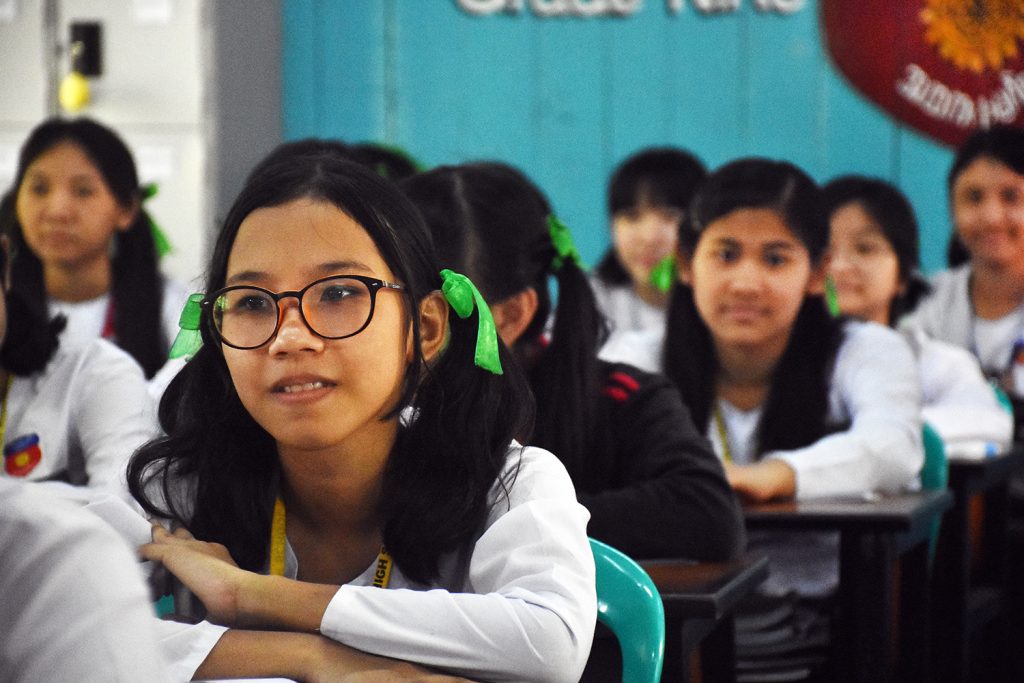
‘Facing a crisis’
An executive member of the Myanmar Teachers’ Federation, who asked not be named because he has gone into hiding, said the huge number of teachers who had openly opposed the junta showed how much things had changed in the profession.
He said that, traditionally, junior level personnel didn’t dare to criticise superiors or disobey orders from the top. “But now, more than 120,000 education staff have disobeyed their seniors. This is an improvement that grew in the past five years because we saw what democracy is,” he said.
Ministry of Education data on monthly salaries shows that high school teachers receive K226,000, middle school teachers K208,000 and primary school teachers, K180,000.
Although it is hard to make ends meet on their salaries, teachers interviewed by Frontier said they were satisfied with their pay rates, especially given the scarcity of stable and reputable jobs.
For CDM teachers that lack family wealth, therefore, the decision to strike and accept dismissal has entailed a major sacrifice. While Sandar Moe can survive with the support of parents who own farmland, Thazin Nwe had relied on her salary to support herself and her mother.
“If the revolution takes a long time, I will have to leave the village to find work in an urban area,” she said.
None of the five striking teachers interviewed by Frontier had received financial or other support from the National Unity Government, established to oppose the junta by MPs elected last November.
Dr Zaw Wai Soe, the NUG’s education minister, told Radio Free Asia on May 18 that it had prioritised supporting CDM teachers but did not say how the support would be provided.
“The NUG has decided that if we get one kyat, we will give one kyat to the CDM. If I get ten kyat, I will give ten kyat to them. All the money we receive from the people will be for the CDM,” he said.
In a sign that the help might finally be forthcoming, the striking teachers said the NUG education ministry had in May begun compiling a list of striking educational personnel to receive aid on a priority basis.
A village-level CDM leader in Ayeyarwady Region’s Danubyu Township said he had submitted the names of 10 teachers in urgent need of financial help to higher levels of the movement.
“All CDM staff are facing a crisis,” he said, adding that it would take time for the necessary support to be rolled out, and that some people will inevitably be left out. “It’s not possible for the NUG to give financial aid to everyone. First, we will prioritise teachers who don’t have anyone to rely on. All CDM staff have agreed to this.”
A CDM support group called Piti, Burmese for “joy”, said it had already helped over 1,800 CDM teachers nationwide using funds that have been raised through private donations from the public, who were receiving K90,000 a month.
A Piti staffer said that while some teachers had only requested one-off payments, rather than monthly support, Piti is continually receiving new applicants from across the country and “we don’t have enough funding to support all of them”. To make up the shortfall, he said the group is “urging the public to donate”.
Ma Khine Mar, 24, a striking primary school teacher in a village in Ayeyarwady Region, said she appreciated the difficulties facing the NUG, even though neither she nor any other CDM participants in the area had received any aid from them.
“I believe that they are working for us. They are doing their duty while having to hide from the military. Our difficulties are small compared to theirs,” she said.
‘Fake education’
Township-level education departments are trying to fill the vacancies left by striking teachers by seeking applications from bachelor’s degree holders who will be employed as daily wage earners. These temporary teachers were introduced during the Union Solidarity and Development Party government, in office from 2011 to 2016, but were discontinued the following year by the new National League for Democracy government.
The executive member of the MTF said he was worried the reintroduction of this hiring policy would bring in unqualified teachers.
“People are boycotting the junta’s slave education system, so educated people obviously won’t apply for the daily wage positions, while people who’d be unqualified in normal times as well as military supporters will apply,” he said, believing this was “very dangerous for the future of education in our country”.
Frontier could not confirm how many people have applied for the daily positions, but many teachers say they are known to include military and USDP supporters, who aren’t being asked to pass the usual tests.
Striking primary school teacher Thazin Nwe said that when she was hired in 2016, she had to pass through a highly competitive, multi-stage process, which the junta seems to have waived in its desperate bid to find replacement teachers.
“We had to take a writing exam first, and if we passed that, we would be interviewed,” said Thazin Nwe, who was one of 27 people recruited by the township education department out of 600 applicants. “Each township hired two or three dozen people out of hundreds of applicants. After we were hired we had to attend two, two-month training courses at Pathein Education College.”
This year, education departments have not announced the lists of those selected to take the writing test, leading to speculation that applicants will be hired without having to sit an exam.
The retired vice rector believes the SAC will struggle to fill teaching positions even with drastically lowered recruiting standards.
“Even in normal times, there aren’t enough teachers in our country, even though 21 education colleges and two education universities produce about 10,000 teachers a year. It is impossible to fill the vacant positions of CDM teachers through the daily wage recruitment system,” she said.
She added that the inevitable recruitment of unqualified teachers would do enormous damage to the quality of education. She found this particularly sad given the progress made in recent years in improving education, which decades of military rule had left in a parlous state. She explained that, before the coup, school curricula were being upgraded in line with the NLD government’s ambitious education reforms.
The transition of curricula began when the K-12 system, which added two years to pre-tertiary education, was introduced for the 2016-2017 academic year and is yet to be completed.
“New curricula are difficult even for existing teachers. How can newbies handle it? If the SAC continues to force schools to open during this crisis, it will totally result in slave education. We cannot expect any improvements in teaching,” she added.
Thazin Nwe said she will resume teaching only under the government elected in the 2020 election, and she urged students and parents to wait for that day with her.
“I believe that parents will not send their children to schools opened by the junta. The quality of education will be poor because the junta only needs people to run their [administrative and military] systems,” she said, referencing the widespread belief that the previous military dictatorship intentionally degraded education, so as to produce students who only knew how to follow orders. “It will be a fake education.”


